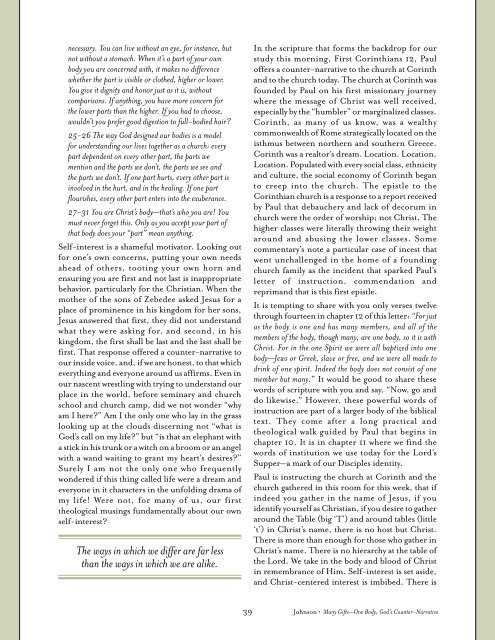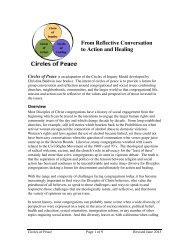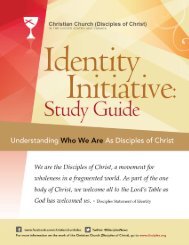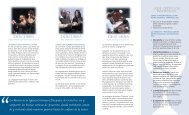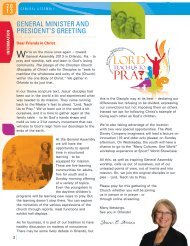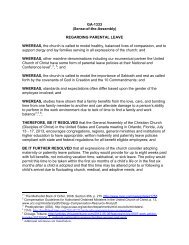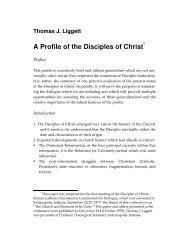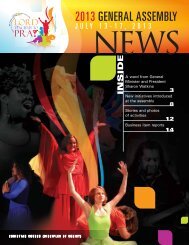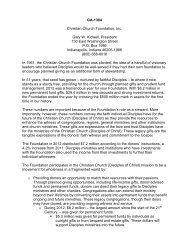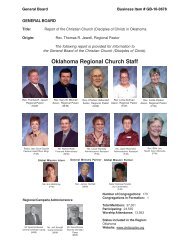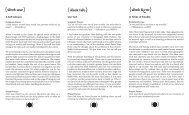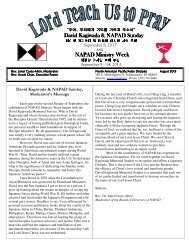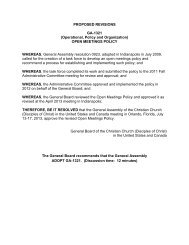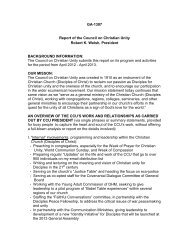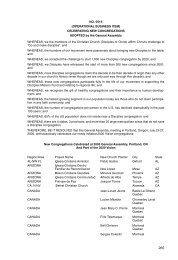RESOURCING THE CHURCH FOR ECUMENICAL MINISTRy A ...
RESOURCING THE CHURCH FOR ECUMENICAL MINISTRy A ...
RESOURCING THE CHURCH FOR ECUMENICAL MINISTRy A ...
Create successful ePaper yourself
Turn your PDF publications into a flip-book with our unique Google optimized e-Paper software.
necessary. You can live without an eye, for instance, but<br />
not without a stomach. When it’s a part of your own<br />
body you are concerned with, it makes no difference<br />
whether the part is visible or clothed, higher or lower.<br />
You give it dignity and honor just as it is, without<br />
comparisons. If anything, you have more concern for<br />
the lower parts than the higher. If you had to choose,<br />
wouldn’t you prefer good digestion to full-bodied hair?<br />
25-26 The way God designed our bodies is a model<br />
for understanding our lives together as a church: every<br />
part dependent on every other part, the parts we<br />
mention and the parts we don’t, the parts we see and<br />
the parts we don’t. If one part hurts, every other part is<br />
involved in the hurt, and in the healing. If one part<br />
flourishes, every other part enters into the exuberance.<br />
27-31 You are Christ’s body—that’s who you are! You<br />
must never forget this. Only as you accept your part of<br />
that body does your “part” mean anything.<br />
Self-interest is a shameful motivator. Looking out<br />
for one’s own concerns, putting your own needs<br />
ahead of others, tooting your own horn and<br />
ensuring you are first and not last is inappropriate<br />
behavior, particularly for the Christian. When the<br />
mother of the sons of Zebedee asked Jesus for a<br />
place of prominence in his kingdom for her sons,<br />
Jesus answered that first, they did not understand<br />
what they were asking for, and second, in his<br />
kingdom, the first shall be last and the last shall be<br />
first. That response offered a counter-narrative to<br />
our inside voice, and, if we are honest, to that which<br />
everything and everyone around us affirms. Even in<br />
our nascent wrestling with trying to understand our<br />
place in the world, before seminary and church<br />
school and church camp, did we not wonder “why<br />
am I here?” Am I the only one who lay in the grass<br />
looking up at the clouds discerning not “what is<br />
God’s call on my life?” but “is that an elephant with<br />
a stick in his trunk or a witch on a broom or an angel<br />
with a wand waiting to grant my heart’s desires?”<br />
Surely I am not the only one who frequently<br />
wondered if this thing called life were a dream and<br />
everyone in it characters in the unfolding drama of<br />
my life! Were not, for many of us, our first<br />
theological musings fundamentally about our own<br />
self-interest?<br />
The ways in which we differ are far less<br />
than the ways in which we are alike.<br />
39<br />
In the scripture that forms the backdrop for our<br />
study this morning, First Corinthians 12, Paul<br />
offers a counter-narrative to the church at Corinth<br />
and to the church today. The church at Corinth was<br />
founded by Paul on his first missionary journey<br />
where the message of Christ was well received,<br />
especially by the “humbler” or marginalized classes.<br />
Corinth, as many of us know, was a wealthy<br />
commonwealth of Rome strategically located on the<br />
isthmus between northern and southern Greece.<br />
Corinth was a realtor’s dream. Location. Location.<br />
Location. Populated with every social class, ethnicity<br />
and culture, the social economy of Corinth began<br />
to creep into the church. The epistle to the<br />
Corinthian church is a response to a report received<br />
by Paul that debauchery and lack of decorum in<br />
church were the order of worship; not Christ. The<br />
higher classes were literally throwing their weight<br />
around and abusing the lower classes. Some<br />
commentary’s note a particular case of incest that<br />
went unchallenged in the home of a founding<br />
church family as the incident that sparked Paul’s<br />
letter of instruction, commendation and<br />
reprimand that is this first epistle.<br />
It is tempting to share with you only verses twelve<br />
through fourteen in chapter 12 of this letter: “For just<br />
as the body is one and has many members, and all of the<br />
members of the body, though many, are one body, so it is with<br />
Christ. For in the one Spirit we were all baptized into one<br />
body—Jews or Greek, slave or free, and we were all made to<br />
drink of one spirit. Indeed the body does not consist of one<br />
member but many.” It would be good to share these<br />
words of scripture with you and say, “Now, go and<br />
do likewise.” However, these powerful words of<br />
instruction are part of a larger body of the biblical<br />
text. They come after a long practical and<br />
theological walk guided by Paul that begins in<br />
chapter 10. It is in chapter 11 where we find the<br />
words of institution we use today for the Lord’s<br />
Supper—a mark of our Disciples identity.<br />
Paul is instructing the church at Corinth and the<br />
church gathered in this room for this week, that if<br />
indeed you gather in the name of Jesus, if you<br />
identify yourself as Christian, if you desire to gather<br />
around the Table (big ‘T’) and around tables (little<br />
‘t’) in Christ’s name, there is no host but Christ.<br />
There is more than enough for those who gather in<br />
Christ’s name. There is no hierarchy at the table of<br />
the Lord. We take in the body and blood of Christ<br />
in remembrance of Him. Self-interest is set aside,<br />
and Christ-centered interest is imbibed. There is<br />
Johnson • Many Gifts—One Body; God’s Counter-Narrative


